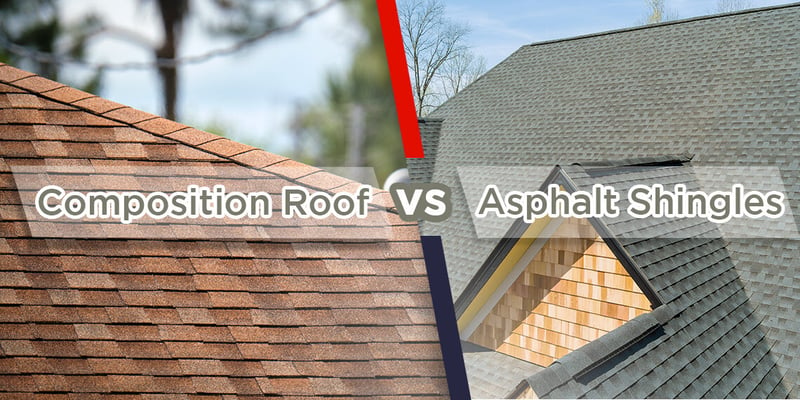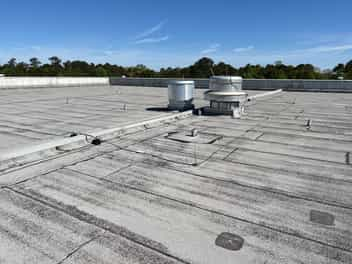- Home »
- Learningcenter »
- Composition roof asphalt shingles
Composition Roof vs Asphalt Shingles: Are They The Same?

Did you know that people think composition roofs and asphalt shingles are two completely different parts? You're not alone if you're confused. This mix-up is pretty familiar among homeowners and builders. Knowing the difference really helps when you're making choices about your roof - it affects how much you'll spend, how long the roof lasts, and even how it looks.
I want to clear up this confusion for you. Let's talk about what makes them different and what they have in common. You'll get the information you need to make smart choices for your home. It's a good idea to understand these things to stay away from mistakes. Your roof is a big investment - so you want to get it right.
Are you ready to learn about it? Let's just jump in! It's going to be really helpful for you.
What Is a Composition Roof?
A composition roof, or what you could call an asphalt shingle roof, is really popular among homeowners. It's made from a combination of parts like asphalt tar paper and mineral granules. This combination gives a nice balance of durability and flexibility. You've probably heard that composition roofs are the popular choice in North America because they give you a combination of low cost and performance that's tough to beat.
You start with a base mat made of either fiberglass or organic cellulose - this gives the roof its strength. Next there's a layer of asphalt which is a sticky substance from petroleum. This acts as the main binder. Topping it off you have mineral granules ceramic-coated that give you UV protection and color. This layering process makes these roofs affordable and strong!

So why do homeowners love them? Mainly, it's the low cost and easy setup. These roofs are budget-friendly and can be put up faster without needing special labor. They also stand up well to different weather conditions and give you some fire resistance - bringing added peace of mind.
An interesting detail is the number available. You can pick from styles and colors. From basic 3-tab shingles to thicker, more textured architectural shingles, there's something to match your home's look. You can even go for luxury shingles that mimic high-end roofing parts. This design flexibility is a big plus.
But let's be real, nothing's perfect. Composition roofs don't last as long as slate or tile. Over time UV rays can cause the granules to fade. There's also the issue of algae growth which could need regular cleaning. Even though these downsides exist, people find the trade-offs worth it given the first savings and general benefits.
There's a myth that these roofs aren't eco-friendly. Modern production methods have really cut down their environmental results. You're also being kinder to the planet. It's a success.
So look at their pros and cons - composition roofs still seem to be at their best as a flexible and affordable roofing material.
What Are Asphalt Shingles Made Of?
You could think composition roofs and asphalt shingles are the same thing. Actually, they aren't - even though people mix up the terms all the time. Composition roofs cover shingles made from different parts, but asphalt shingles are a specific type of composition roof - they're mainly made of fiberglass, asphalt, and ceramic granules.
The makeup of asphalt shingles is pretty easy. A fiberglass mat forms the base and it gives the shingles their shape and strength. Next, the mat gets a coating of asphalt - which makes it waterproof. Then, ceramic granules are added to the surface. These granules don't just give a grainy feel - they also protect the shingles from UV rays.
Knowing how they're made helps you see why people really like these shingles. First, a continuous fiberglass mat goes into a fabrication line. Next, hot asphalt coats the mat, and ceramic granules are sprinkled on top. To keep shingles from sticking together when stored, the backside gets a coating of sand or slag fines.

Let's talk about the types of asphalt shingles you can find. There are two main kinds: 3-tab shingles and architectural shingles. Each has its pros and cons. 3-tab shingles are flat, single-layered, and cheaper. But they're less tough and not perfect for harsh weather areas.
Architectural shingles are sturdier! They have multiple layers fused together, which gives a 3D look. These shingles are heavier, last longer, and come with a lifetime warranty.
Why do so many people choose asphalt shingles for their homes? One big reason is the cost. They're cheaper than other roofing choices, but they don't skimp on durability or ease of installation. Another plus is low maintenance. Each year, over 15 billion square feet of asphalt roofing shingles are made and put on homes in the U.S.
With what you know now about the shingles and how they're made, it's clear why asphalt shingles stay popular in home roofing. They give you a good combination of cost, durability, and ease of installation, which makes them a savvy choice for homeowners.
Are They Really the Same Thing?
Yes and no. You sometimes hear people thinking composition roofs and asphalt shingles are the same thing. It's pretty clear why that's the case.
Even though people use the terms interchangeably, knowing when the difference matters can help. Just to give you an example, composition shingles can have a wider number of parts like ceramic, glass fiber, paper, slate, and wood fiber. This number affects performance and looks. You'll find that these small differences really count depending on what you need.
You could wonder about the types of asphalt shingles. There are three: 3-tab, architectural (also called dimensional or laminate), and luxury shingles. Each type has its own features and benefits - take architectural shingles just to give you an example. They last longer - up to 50 years with maintenance. That's a long time, and it gives you peace of mind.
The parts also play a role in weather resistance. Composition shingles can stand up to strong winds and UV rays better than regular asphalt shingles. Here's where the cost factor comes in. While asphalt shingles are cheaper, you can see that the durability and style of composite shingles make the extra money worth it. This added durability can give you long-term savings.

Here's a helpful point: Insurance businesses sometimes say "composition" when dealing with roof damage claims. This term makes it easier to talk about things and shows how the industry views these interchangeable names. They're used broadly but have big results.
Why does the distinction matter? It comes down to specifics. For lifespan, composition shingles can last up to 50 years. On the other hand, regular asphalt shingles go for 15-30 years. This really matters if you plan on selling your home. Buyers would like to know they won't have to replace the roof soon. Helpful details like these sometimes guide the choice between the two options.
When it comes to looks, types can really help with your home's curb appeal. Asphalt shingles give you reliable performance, while composite shingles want to imitate the look of high-end parts like slate or cedar shakes. That means you get that fancy look without a huge price tag, which makes it pretty interesting for buyers.
You'll feel more confident about your choice!
How Do Costs Compare?
You're probably wondering if a composition roof and asphalt shingles are really the same thing. As we just learned, they're not. But let's dig into why that actually matters - especially for first and long-term costs!
Looking at first installation costs, you'll find that asphalt shingles are less expensive. You can expect to pay around $80 to $100 per 100 square feet for parts. Adding labor costs, which run about $2 per square foot, makes the total pretty reasonable. So, if you're keeping an eye on your budget right now, asphalt shingles are a smart pick. But remember that cheaper now doesn't always mean cheaper later on.
On the other hand, composite shingles can cost you anywhere from $100 to $150 per 100 square feet for parts. Labor fees are higher because these shingles are heavier and require more skill to install, so the initial cost is a bit higher. But here's where it gets intriguing: composite shingles need less maintenance over time. While you could spend more first, you could save on maintenance later.

Thinking about long-term maintenance costs, asphalt shingles need more regular care. Professional cleaning is every three to five years - costing around $0.30 to $0.60 per square foot. Those costs can pile up! Plus, asphalt shingles have a lifespan of about 20-30 years. So you'll most likely need to replace them sooner than composite shingles.
In contrast, composite shingles last much longer, about 40-50 years. They need minimal maintenance, just debris and gutter cleaning - it really makes a difference over time.
Talking about worth, asphalt shingles seem cheaper at first but come with hidden long-term costs. Composite shingles cost more initially but give you a longer lifespan and less trouble. If you plan on staying in your home for a long time, composite shingles could give you better worth overall. This long-term perspective will help you make an informed choice.
Financial assistance options also matter. Warranties for asphalt shingles range from 20 to 30 years (composite shingles sometimes come with lifetime warranties), which is a big deal. It gives some peace of mind for the future. Composite shingles are more energy-efficient too, which could lower your energy bills and cause possible rebates.
Now, about insurance. Some insurers could give you lower rates if you have composite shingles since they are thought to be harder and more energy-efficient. That could change your decision - it's an extra factor that adds weight to your choice.
You need to think about the whole picture: first costs, long-term maintenance, warranties, and even possible savings on energy and insurance. This wider view helps you make a well-rounded decision.
Which Offers Better Durability?
Composition roofs and asphalt shingles could feel like the same thing but they have their own benefits in terms of durability. You could wonder how long each actually lasts. Composition roofs last for about 20 to 50 years - asphalt shingles, on the other hand, stick around for roughly 15 to 30 years. That difference can be known when you're planning for long-term home maintenance. You don't want to be caught off guard by a failing roof!
You could also think climate plays a huge role in their lifespan - and you're right. Extreme weather like heavy rain, hail, and high winds can really damage types. But composition roofs sometimes do better in rough conditions. Their water-resistant parts mean fewer leaks over time. This can be especially relevant if you live in an area open to harsh weather. Small differences like these really add up.
Decent installation matters quite a bit too. Getting experienced pros to install your roof the right way is super important. A well-installed roof will last much longer than a poorly installed one. You should also keep up with regular maintenance. Periodic inspections and quick repairs can really extend the life of your roof! Ignoring these can cause early problems costing you more in the long run. Taking these steps helps you stay away from expensive surprises.

Now, the resistance to familiar roofing problems. Composition roofs resist leaks better because of their design and water-resistant parts. If you've ever dealt with a leaky roof, you know how annoying and expensive it can be. Wind damage is another big concern. Composition roofs have a high resistance rating and handle extreme weather conditions better than asphalt shingles. High winds can rip off shingles - but composition roofs stay put more. You'll like this during stormy seasons.
Algae growth could not be on your radar but it's a big concern. Composition roofs are less likely to get algae because of their reflective coatings. Algae can make your roof look bad and even mess up its functionality over time. Reflective coatings on composition roofs help stay away from this issue. They keep your roof looking fresh and working well longer.
I've seen asphalt shingles start to crack and warp after a few years. Composition shingles, on the other hand, manage better over time. Think of it like comparing a leather jacket to a cheap windbreaker - both keep you dry, but only one really lasts. Composition shingles also handle sun damage and UV rays better. Their protective coating keeps them from cracking, which is important if you live in a sunny place. The UV protection can really help with your roof's health and keep it looking sharp.
Protect The Roof Over Your Head
When it's your own home at stake, the differences and similarities between the two kinds of roofing parts really matter. You should think about your local weather, how much you're willing to spend, and how long you plan on staying in your home. All these things play an important part in what you choose.
Also, it's pretty interesting to think about how these roofing choices affect your day-to-day peace of mind. Wouldn't it be nice to know your roof is able to manage whatever the weather throws at it? Or to realize you won't need to worry about non-stop repairs? If you think about these points now, you can save yourself stress and money later on - considering these things will make sure the roof over your head is reliable and sturdy.

To keep your investment safe and make sure your home stays protected, you'll need professional help. At Colony Roofers, we start with commercial and residential roofing. Our main offices are in Georgia, Florida, and Texas. Trusting pros like us for your roof repair and installation needs is a no-brainer when it comes to protecting your property and peace of mind. You can reach out to us today for a free inspection! We'll show you the level of expertise and care your roof really deserves.
 Call (678) 365-3138
Call (678) 365-3138



